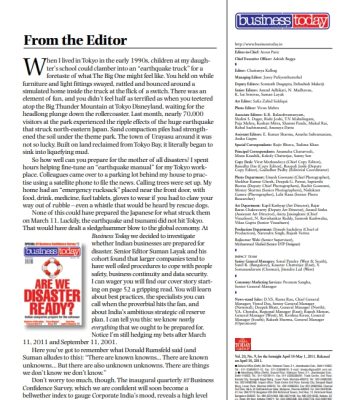Are We Disaster Ready?
[Business Today]
Published date: 1st May 2011
When I lived in Tokyo in the early 1990s, children at my daughter’s school could clamber into an “earthquake truck” for a foretaste of what The Big One might feel like. You held on while furniture and light fittings swayed, rattled and bounced around a simulated home inside the truck at the flick of a switch. There was an element of fun, and you didn’t feel half as terrified as when you teetered atop the Big Thunder Mountain at Tokyo Disneyland, waiting for the headlong plunge down the rollercoaster. Last month, nearly 70,000 visitors at the park experienced the ripple effects of the huge earthquake that struck north-eastern Japan. Sand compaction piles had strengthened the soil under the theme park. The town of Urayasu around it was not so lucky. Built on land reclaimed from Tokyo Bay, it literally began to sink into liquefying mud.
So how well can you prepare for the mother of all disasters? I spent hours helping fine-tune an “earthquake manual” for my Tokyo work- place. Colleagues came over to a parking lot behind my house to practice using a satellite phone to file the news. Calling trees were set up. My home had an “emergency rucksack” placed near the front door, with food, drink, medicine, fuel tablets, gloves to wear if you had to claw your way out of rubble – even a whistle that would be heard by rescue dogs.
None of this could have prepared the Japanese for what struck them on March 11. Luckily, the earthquake and tsunami did not hit Tokyo. That would have dealt a sledgehammer blow to the global economy. At Business Today we decided to investigate whether Indian businesses are prepared for disaster. Senior Editor Suman Layak and his cohort found that larger companies tend to have well oiled procedures to cope with people safety, business continuity and data security. I can wager you will find our cover story start- ing on page 52 a gripping read. You will learn about best practices, the specialists you can call when the proverbial hits the fan, and about India’s ambitious strategic oil reserve plan. I can tell you this: we know nearly everything that we ought to be prepared for. Notice I’m still hedging my bets after March 11. 2011 and September 11, 2001.
Here you’ve got to remember what Donald Rumsfeld said (and Suman alludes to this): “There are known knowns… There are known unknowns… But there are also unknown unknowns. There are things we don’t know we don’t know.”
Don’t worry too much, though. The inaugural quarterly BT Business Confidence Survey, which we are confident will soon become a bellwether index to gauge Corporate India’s mood, reveals a high level of optimism, and a readiness to ride the big waves of inflation.
Two sparkling interviews, with trade-economics guru Professor Jagdish Bhagwati and WPP’s Martin Sorrell; a landmark special report on why the private sector is piling into education; a South Indian road trip redolent with the highs and lows of the Golden Quadrilateral; and the intriguing tale of how South Korea’s Posco has not been putting all its eggs in its Orissa basket if you don’t mind my saying so myself. this issue is unputdownable.






